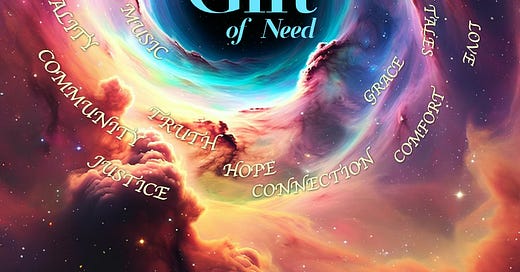Introduction to The Gift of Need - Part 2
Welcome to a new series by Jude DiMeglio Trang, author of Opiate Nation.
Refusing to ask for help when you need it is refusing someone the chance to be helpful.
– Ric Ocasek, front man for The Cars
How is our sense of needing others developed in our lives? Is it something we are taught or is it caught or is it never even considered? I would say that in much of Western society and in America in particular, needing others is not even on our radar. I think this goes back to our sense of independence and individuality. We can pick ourselves up by our own bootstraps and we don’t need anybody else to help us figure things out. It is considered a strength to be independent and self-reliant. Which are definitely important aspects to incorporate into our self-image. But as is the case with most things in life, striking a balance is important.
I think people often misunderstand what it means to need others. Feeling “needy” is not a particularly healthy way to view ourselves as we move in this world and relate to others. On the other hand, neither is the idea that we are without the need of others in order to live healthy and productive lives. My personal belief is that it is basically pride that causes us to feel that if we admit need, we are “less than.” Which to me is illogical – because we all have needs at different times and different situations throughout our lives.
As I considered need throughout human history, I began pulling stories from of some of the fascinating eras and people where there was need and how that need was met. There is no book big enough to contain every area of human need. But in touching on many of the common areas, I hope to give a springboard for further pursuit. I explore the benefits of need through investigating natural, societal, historical, psychological and spiritual elements.
I wrote The Gift of Need because I hope it can offer the world a new point of view so that people will begin to view needs not as weakness but rather as pathways to connection and community. That they will learn to recognize pride and overcome it and ask for help and know that they and the one who offers help will benefit in many tangible and intangible ways. I hope that others will find inspiration to use their gifts to help meet needs. In taking these steps, I believe it will foster empathy, humility, joy and thereby strengthening our families, communities, and society as a whole.
We have all heard the saying from Shakespeare’s Merchant of Venice, “All that glitters is not gold.” J.R.R. Tolkien turned that around in The Lord of the Rings when he said, “All that is gold does not glitter.” As we naturally view need as the opposite of a gift, this is a question we want to ponder:
Can a valuable, priceless gift be packaged in plain or unattractive wrapping, causing us to focus more on what is readily visible, rather than discovering what lies within?
Watch for the new Gift of Need Podcast with exciting guests and conversations. Coming soon!





